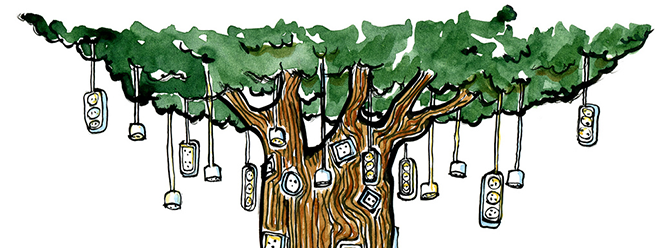
by Tara Joyce | Jan 5, 2014 | My Journey | What's On My Mind

Happy New Year to you! I hope you’ve had a restful and lovely holidays.
I love the potential of this time of year, an old year ending and new one starting.
Being a naturally introspective person, and combining that with a cultural attachment to reviewing the year that has passed, I’ve often found I’m pressuring myself as the calendar year comes to a close to UNDERSTAND something about the time that has passed.
This year I decided to let that go. My attachment to UNDERSTANDing. I let the year just be.
And when I did, I found myself naturally, on New Year’s Eve, seeing the year behind me. I saw a year where I had transformed my relationships.
If there was something for me to UNDERSTAND about 2013, it was about relationship. My relationship with …attachment …release …my mind …my heart …creating …criticism …sharing …authenticity …perspective …recognition …authority …shame …and so much more.
2013 taught me that when I allow myself to change my relationship with something, I allow myself to let go of something holding me back.
I suspect you may have learned something similar.
Now we find ourselves starting 2014, and we are more centred in our self, and in turn, our relationships. Our structures have been fortified.
I don’t dare to guess what 2014 holds for us. For I know whatever I do dream up will fall short of reality.
But I do dare to plan. To continue growing more into me. And the power and love of what I am creating in this world.
For 2014 and always, I wish the same for you.
love,
photo credit: challiyan

by Tara Joyce | Dec 12, 2013 | Cultural Creativity

Do you believe that if you don’t remind people of the fact that you exist, they will forget you?
Do you see yourself, and your work, as forgettable?
I don’t.
I believe in being unforgettable. And I believe you are.
I believe that we are encouraged to feel that we are forgettable for the benefit of some.
For when we feel forgettable, we feel fearful. And that fear drives us to buy, and to seek out people who say they know better than we do. We want to believe they are the antidote for our total forgettableness.
Why do we minimize our value so much that we actually believe we need tricks and incentives, expert opinions, flashing lights and Remember Me’s to get and keep clients?
Being unforgettable is our true business aspiration. ‘Building our list’ is not.
You, and your work, are enough for me to remember you by.
Make the experience be your advertising.
photo credit: gabenneschcolor

by Tara Joyce | Nov 13, 2013 | Cultural Creativity

Look around you.
Where, and with whom, are you spending your Energy?
Do you feel like your spending it wisely?
If not, it could literally be the reason why you are having issues with money. For money, too, is an Energy.
Reflecting on your “money situation” does it mirror back important information about how you spend your Energy?
What do your money spending habits reveal about your energy spending habits?
A Fair Exchange.
Is there anywhere that you are “spending” too much “Energy”? If so, this is a to pay attention to.
For your Energy is worth so much more than that.
photo credit: hikingartist

by Tara Joyce | Nov 4, 2013 | Pay What It's Worth Pricing

An Exciting Concept
I learned about the concept of Pay What It’s Worth pricing as a result of an email from a reader, Jay Cowan. He recommended I check out the book called Secrets of the Wealthy Mind, as it discussed the concept of Innerpreneurs.
At the time (2009), there was only one book I knew that mentioned and identified Innerpreneurs as a group, and so I was fascinated.
Jay also mentioned that the author, Phillip Dignan, had “an interesting way of selling it”, referring to pricing system he used to sell the book — he let his customers decide what they paid for it.
It was the first time I had ever heard of someone doing such a crazy thing, and I was intrigued.
I read Secrets of the Wealthy Mind in one day, and it blew my mind. Dignan’s perspective on economic theory and pricing systems turned something on in me, and it helped expanded my mind to see that I’d been following a lot of economic rules that I didn’t believe in.
It supported me in seeing there were alternative models for pricing that would honour my values, ensure the integrity of my client relationships, and create greater possibilities for my own wealth creation.
An Exploration of Worth
During my time exploring Pay What It’s Worth pricing it has come to mean:
- Allowing my customers to determine the true value they place on what they have received.
- Not limiting my wealth potential by setting boundaries on the value placed on my service to others.
- Doing my best on behalf of my client, and trusting that my client with do their best on behalf of me.
- Creating business relationships built on integrity and trust.
- Accepting that my clients can value my work more, and less, than I do.
- Challenging faulty economic assumptions. Economic theory is based on the assumption of scarcity – why is that?
- Unmarketing. Not everybody is comfortable with the responsibility of consciously placing a monetary value on the service they are receiving. And they aren’t the right clients for me.
- An opportunity to increase my awareness on how I, and others in my world, give and receive money.
- An exploration of my self-worth, and true earning potential.
photo credit: gfhughes

by Tara Joyce | Oct 22, 2013 | Cultural Creativity

The wants of others used to matter to me.
I thought somehow they were mine to fulfill.
At some point I decided that while my wants didn’t matter too much, other people’s were of paramount importance.
I convinced myself I was being caring, or helpful, or altruistic, or some other adjective that bathed me in a golden light, in giving what they wanted.
I allowed other people’s wants, and the fulfillment of them, to become my concern.
And while I pretended to be okay with it, and even to enjoy it in the name of giving, what I really felt was how people were taking from me. And I from them.
I was being used, and I was using. I was using them to feel loved, valuable, helpful, and they were using me to get what they wanted.
Neither of us was considering what we needed, what was best for either of us, or our relationship.
Does it matter what you want when you don’t know what you need?
I, and they, were confusing our wants for our needs. I thought I needed to be helpful, and they thought they needed help, but we both simply just wanted it.
We both exerted our power, our esteem for our self, on each other, in hopes that we could get our wants fulfilled, avoiding the work of understanding what we actually needed.
We lacked the love to know what we truly needed — and how to get it. So we stayed focused on our feelings of entitlement to get what we wanted from the other.
We see what we want. But we can see so much more when we look into the truth of why we want things.
The needs of me.
It has taken me time and space to accept that it has always been up to me, and no one else, to obtain the things I need.
The wants of others, and myself, are nice to know but they don’t need matter. They aren’t helpful or hurtful — until they are attached to.
There is nothing wrong with having wants — it’s in the feeling of needing to fulfill them, or not, that my freedom, or my restriction, is born.
photo credit: ashley rose










